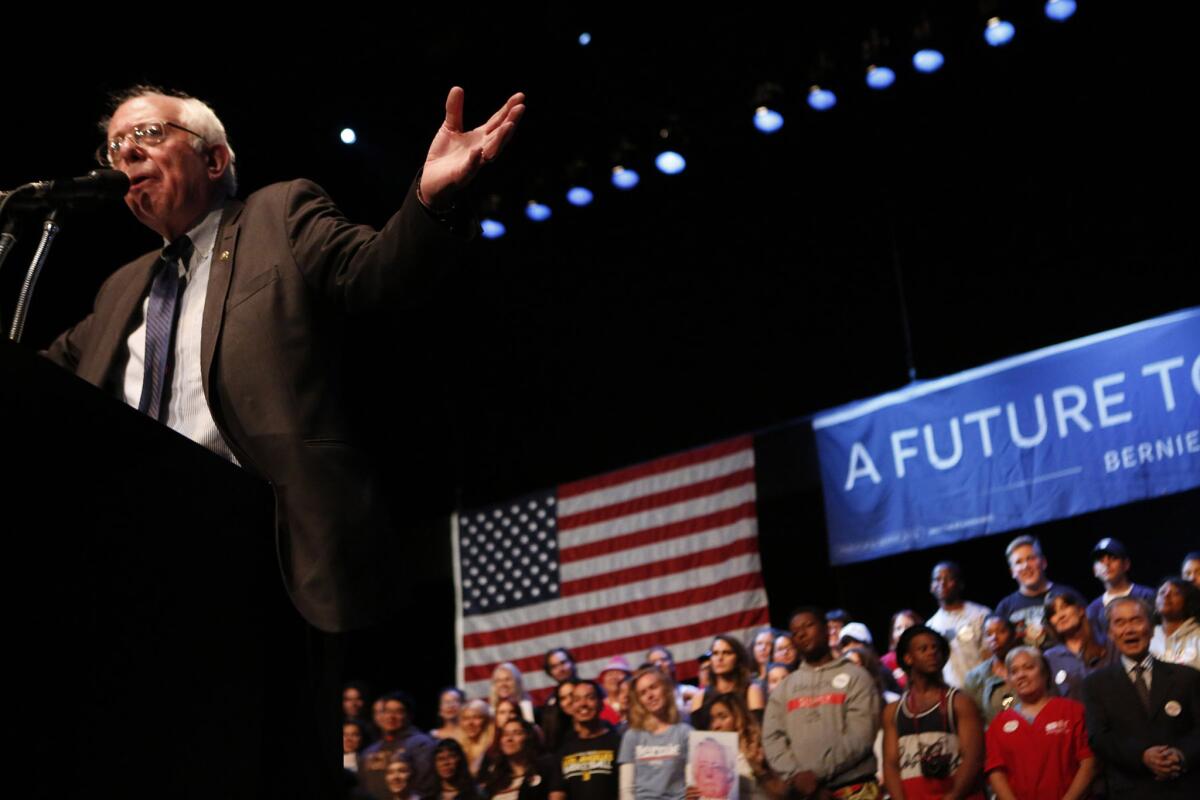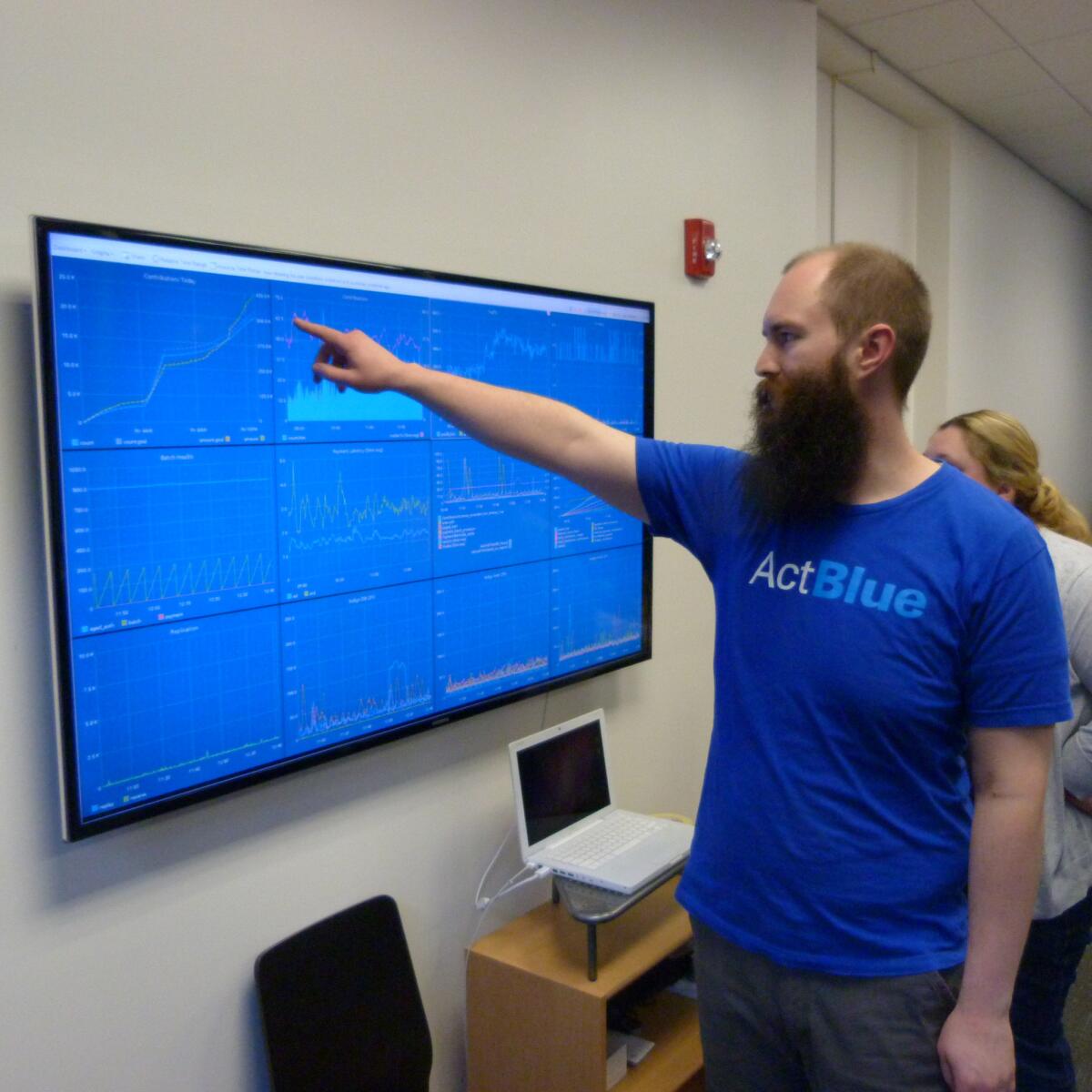Bernie Sanders’ campaign legacy could be how he raises money from so many people

Sen. Bernie Sanders at a rally Wednesday in Los Angeles.
Reporting from SOMERVILLE, Mass. — While Bernie Sanders expresses disdain for big banks and other corporate lenders, some of the most valuable field lieutenants in the Vermonter’s political “revolution” are a band of techies here who have proven masterful at persuading Americans to make credit-card payments.
In a barely marked storefront location down the street from Tufts University, this team heavy with millennials operating under the name ActBlue mills around an office space with the usual tech firm quirks -- beanbag chairs, a pingpong table, a massive net for dropping party balloons – doing work that is not particularly sexy. But it is turning big-money politics upside down.
ActBlue is a decade-old nonprofit that creates fundraising software to help Democrats build networks of donors, instead of leaving them isolated on the various databases controlled by individual campaigns. The system enables donors who might tap into it to give to one particular candidate or cause broaden their participation, and send money to any other ActBlue client by simply punching a button on their phone.
The partnership the Sanders campaign has forged with ActBlue could prove one of the more enduring legacies of this unique election cycle, positioning liberals to raise unprecedented amounts for their candidates and causes long after election day has come and gone.
Election 2016 | Live coverage on Trail Guide | Track the delegate race | Sign up for the newsletter
Before the ride-sharing app Uber even existed, ActBlue was working to endow Democrats with a kind of Uber of politics. Its aim has been to transform a sector of the economy that is notoriously balky, unpleasant to take part in and burdened with layers of bureaucracy into a simple, fun – even addictive – transaction.
“Fundraising was the least democratic part of the democratic process,” said ActBlue Executive Director Erin Hill, who joined the outfit after it was founded in 2004 by two local coders with no connections to the Democratic Party apparatus or its financiers – just an idea for making activism easier. “It was not friendly to a lot of small-dollar donors.”
The donations-on-demand technology won plaudits from activists as it scaled up over the years. But the Sanders campaign has touched off an explosion in ActBlue’s growth by routing much of its fundraising through the nonprofit. ActBlue has expanded to the point where it resembles a Silicon Valley firm that has just been through a wildly successful IPO. So many people have enlisted as ActBlue “Express” users on the way to giving a few bucks to Sanders that the organization now boasts it has the credit-card information of some 2.7 million liberal sympathizers.

Marketing manager Hannah Brown hits the foosballl table in the game room at ActBlue’s Somerville, Mass., headquarters. Behind her is a cardboard cutout of Bill Clinton.
“Many of these people are making a contribution to a campaign for the first time in their lives,” said Michael Whitney, digital fundraising manager for Sanders. “ActBlue makes it very easy for them to give their second, third and fourth contributions. ... They are going to want to see how else they can participate, what else they can support.” The next time one of the thousands of Democratic campaigns using ActBlue asks them for $5 or $10, all they need to do is hit a button on their phone and the deed is done.
Hillary Clinton is not using ActBlue, a platform not typically associated with large-scale presidential campaigns. Nobody envisioned Sanders would be such a fundraising powerhouse when he linked his campaign to it, but his phenomenal success bringing in money through ActBlue — and recruiting new Express users for it — helped usher in a new era for the app, one that opens new fundraising opportunities to Democrats up and down the ballot.
Republican donors, by contrast, are more likely to have to start all over once the campaign ends and they want to enlist with another cause. It’s like an Uber addict visiting in a city where the only option for a short ride is competitor Lyft: They might download the app, register, and punch in all the digits of their credit card, or they might just walk.
“This is something that the Democrats have that the Republicans somehow still don’t,” said David Karpf, a professor at George Washington University and author of “The MoveOn Effect: The Unexpected Transformation of American Political Advocacy.” “It is critical infrastructure.”
Republicans have tried to replicate the technology, but conservative candidates and organizations have yet to rally around a single platform the way many Democrats have with ActBlue, leaving the efforts balkanized and fairly ineffective by comparison.

Nate Thames, executive director of ActBlue Technical Services, keeps close watch of traffic through the fundraising platform at its Somerville, Mass., headquarters.
The technology gap has helped create a big shift to the left in the small-donor revolution, which in the 1990s and later during the tea party insurgence was often associated with Republicans responding to direct-mail appeals. Those donors are still active, and neurosurgeon Ben Carson’s candidacy proved they can still be mobilized. But Carson spent so much money reaching them that little of the money they sent in was left for his campaign.
By contrast, the cost of using ActBlue is less than 4% of each donation made through the app, which covers the charge the credit card company slaps onto each donor transaction. Most of ActBlue’s operations are instead covered by “tips” its users leave.
Those tips come from people like Ella Tabasky, a 35-year-old from Venice, Calif., whose modest salary from working at a nonprofit limits how much she can give. But she has already used her phone to chip in a few dollars to Bernie Sanders 17 times. She’s addicted to the app.
“It makes it so much easier for me to get connected with different causes I support,” she said. “It really is pretty much one click.” Tabasky is so enamored by what ActBlue has done to empower small donors like her that she has donated to its “tip jar” 20 times.
ActBlue was better prepared than possibly anyone in the fundraising business for the big shift toward making donations via iPhones and other mobile devices. It invested heavily in technology that cuts down the amount of time it takes to make a contribution to the fewest possible milliseconds. As it did, traffic spiked. This month, ActBlue announced it had raised more than $1 billion for Democrats since its launch in 2004. More than half of it came since 2014.
Activists cheered the milestone. Among them were the editor-in-chief of the liberal powerhouse blog DailyKos, which early on saw the potential of ActBlue to rally small donors fast. In October 2008, it mobilized against Republican Rep. Michele Bachmann, whose comment during an evening interview on MSNBC that the media should root out her “anti-American” colleagues smacked of McCarthyism to liberals.
The avalanche of donations to Bachmann’s opponent immediately crashed his website. DailyKos bloggers turned to ActBlue, using the nonprofit’s prefabricated widgets to funnel $810,000 to the candidate in 48 hours – almost as much as he had raised in the entire previous year.
“What the left lacks in billionaires, it makes up in its vast grass-roots army,” said a statement from DailyKos editor Markos Moulitsas. “ActBlue helps make it all possible.” ActBlue went on to play a pivotal role in helping Democrats raise money to fund pro-labor candidates in Wisconsin, where Gov. Scott Walker was locked in a battle with unions being watched nationwide. The app made it exceedingly easy for activists watching from afar to engage in local Wisconsin politics.
The massive number of transactions that run through ActBlue every day provide a treasure trove of data that the nonprofit and its clients use to constantly readjust their methods to draw in more money. “All that data itself gives them a huge edge,” said Karpf, who compared it to that held by firms like Amazon and Google, where the enormous number of customers enables a constant refinement of service that competitors struggle to match.
But another factor driving ActBlue’s growth might be less expected: the conservative Koch brothers network, which serves as a motivating symbol for ActBlue’s users.
“Our donors are very much paying attention to the fact that the Koch brothers are there,” said Hill. “And they are enjoying their role in countering them.”
Twitter: @evanhalper
ALSO
Sanders on California’s primary: ‘You’re going to see me here more than you feel comfortable with’
Bernie Sanders rocks the Los Angeles faithful in a rally at the Wiltern
These Republicans know the presidency shouldn’t be reality TV. But they’ll vote for Trump anyway
More to Read
Get the L.A. Times Politics newsletter
Deeply reported insights into legislation, politics and policy from Sacramento, Washington and beyond. In your inbox three times per week.
You may occasionally receive promotional content from the Los Angeles Times.











